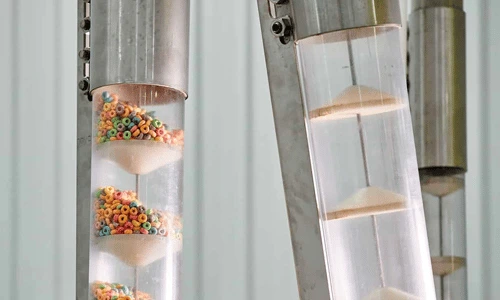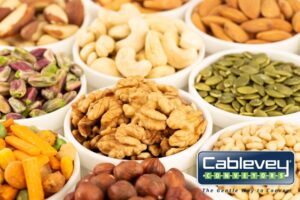Food processors frequently test, and sometimes even retest, their goods on conveyor systems that they are thinking about buying. All food products and raw ingredients, after all, have unique properties that will dictate how they respond to the strains and stressors of transportation. Important information on flow characteristics, throughput, breakage possibility, safety precautions, cleaning needs, and maintenance procedures is provided by this testing. It is also essential for permitting precise sizing and evaluation of equipment.
Material Testing – Gathering Information Before Purchase
To gain a better grasp of the material properties of their product before purchase, many in the industry are now doing material testing beforehand. Powders can be assessed to determine bulk density, moisture content, and angle of repose to determine flowability in a fully furnished laboratory.
These tests are yielding a wealth of information that is being used to solve product-specific issues with powder, including stickiness, abrasiveness, compaction, and inadequate flowability. These elements may even be quite important when choosing between tubular cable drag, flexible screws, and aeromechanical conveyor systems.
“With material testing, the main concern is usually conveyability. Through laboratory analysis, we can assess the flowability of the material to determine the throughput [a conveyor] will be able to deliver,” says Dr.-Ing. Emmanuel Ricohermoso III, Operations and Testing Manager of Automated Handling Solutions Germany GmbH Test Center in Friedrichsdorf.
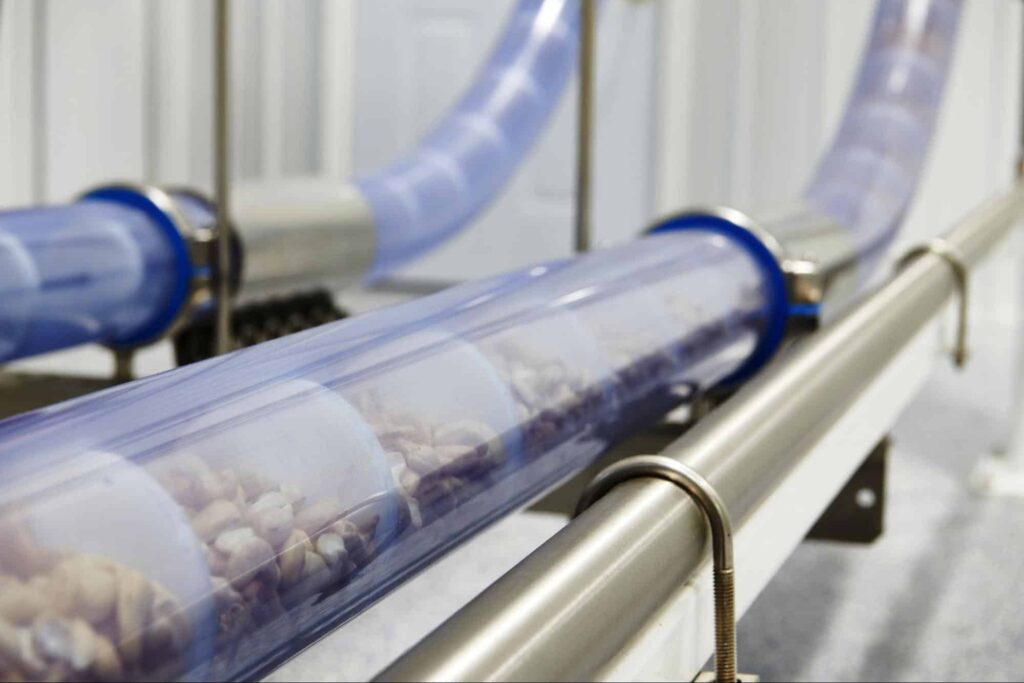
Automated Handling Solutions (AHS) – Market Leader In Material Handling
Including Cablevey Conveyors, a market-leading OEM of tubular cable drag conveyors for food and high-value industrial applications, and Spiroflow, a global manufacturer of material handling equipment and provider of control systems integration, Automated Handling Solutions (AHS) offers a full suite of material handling equipment and industrial automation.
Food processors can choose the kind and brand of conveyor and make informed decisions about it based on known material attributes by using rigorous testing. By using this method, equipment engineers may also design specialized solutions that meet the unique needs of processors, resulting in increased productivity, uptime, conveyor dependability, and product quality.
More Assessable and Comprehensive Testing
Reputable OEMs have made investments in state-of-the-art facilities to provide food processors with complete material characterization and conveyor testing services. These services are easily accessible from major international airport hubs and are frequently offered for free or at a very low cost.
For instance, the AHS Germany GmbH Test Center is a testing facility spanning 645 square meters (6,942 square feet) that is centered around a test workshop furnished with product transfer systems from brands such as Cablevey Conveyors, Spiroflow, and the Advanced Material Processing (AMP) group of companies Kason and Marion.
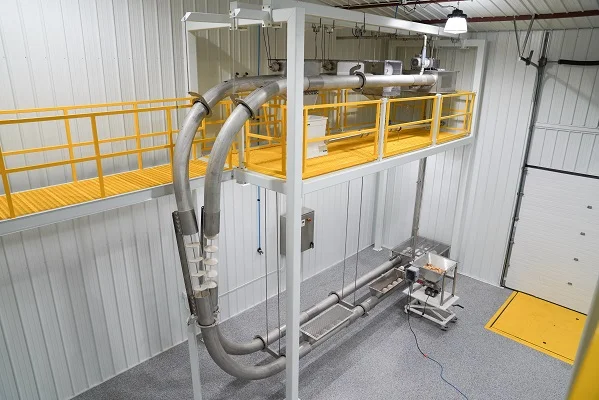
A State-Of-The-Art in-House Laboratory Dedicated To Material Characterization
“If the material test is something that is already part of our portfolio and it is already set up in the lab, we often offer it at no cost to food processors. Typically, we only charge if there is some special setup that we must do for the testing itself,” says Dr. Ricohermoso.
“Laboratory analysis is a quick and simple way to assess product conveyability,” says Dr. Ricohermoso. “Instead of testing a bulk of sample, 150 kg or more, lab analysis will only require a kilo of the sample to measure the densities (bulk and tapped), moisture content, particle size distribution, friability, flowability indices such as Hausner ratio, Carr’s Index, angle of repose, and slip angle. We also consider qualitative analysis such as the tendency of the sample to be static, to form ratholes, to bridge, or to compact.”
“Lab analysis requires less work but offers a lot of data about the material itself. This process helps us come up with a suitable device that is tailored to the product,” he adds.
Testing Results Help Determine Optimal Conveying Solution
Gentle Conveying With Cablevey Conveyors
For example, an enclosed tubular conveyor system from Cablevey Conveyors is frequently advised if the testing show the product is prone to breakage or damage. Because they use a flexible, coated stainless-steel drag cable that is dragged through on a loop to gently move products through a sealed tube, tubular drag cable conveyors are excellent at minimizing product damage.
The product is forced through the tube without the use of air by solid circular discs, or flights, that are fastened to the cable. These conveyors can move up to 2,000 cubic feet of materials per hour in a variety of shapes and layouts, as well as delicate, accurate blends for a wide range of food varieties.
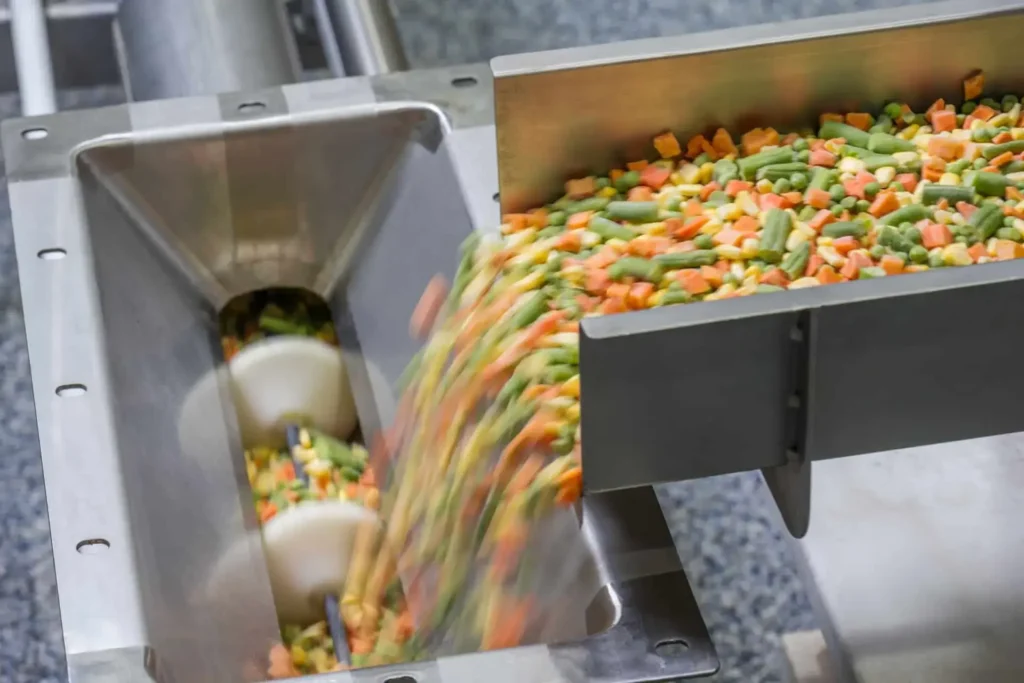
Aero Mechanical Conveyors For Rapid Transport
A variety of conveyor types might be considered as alternative solutions when processors are less concerned with preventing product damage. Aero mechanical conveyors such as Aeroflow can be used for rapid product transport. These conveyors are tubular in shape, with a high-speed cable assembly that features uniformly spaced polyurethane discs. Granulated and powdered sugar are two examples of materials that are well-suited for transportation in big quantities using enclosed aero mechanical conveyors.
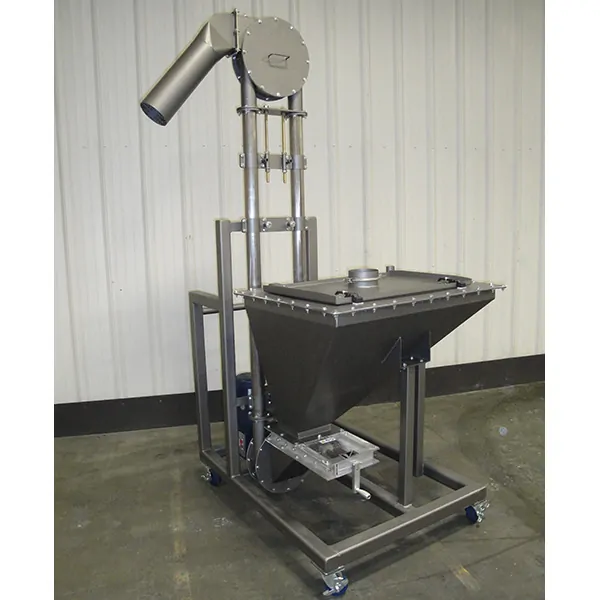
Flexible Screw Conveyors For Less Sensitive Materials
Flexible screw conveyors are made to move goods in both horizontal and vertical directions, making them ideal for less delicate products. The spiral, the only moving component of the flexible screw conveyor, continuously mixes the product as it transmits, which makes it perfect for items like flour. These conveyors are inexpensive to operate and need little maintenance due to their straightforward design.
Once the best conveyor type has been determined, the food processor should test the equipment in bulk using the real machinery there. The facility’s engineers and technicians can identify and recommend fixes for problems with stickiness, temperature, breakage, and other concerns during conveyor testing. Complete results documentation, including a comprehensive report with video and recommendations, is sent to food producers.
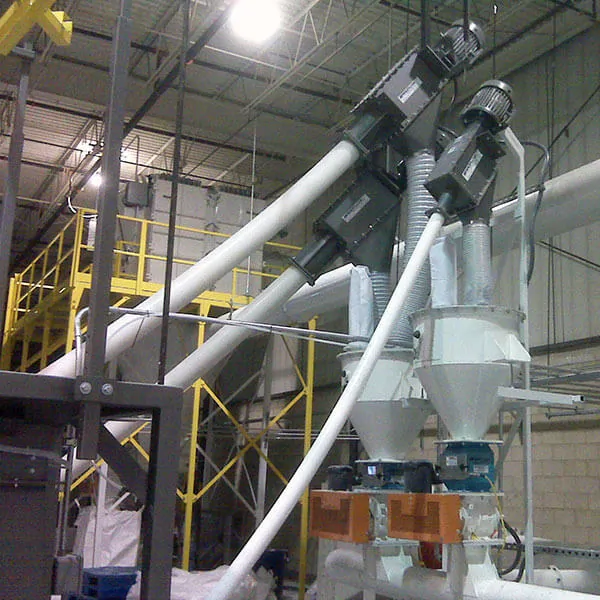
AHS Germany GmbH Test Center Offers An Extensive Testing Possibilities at NO COST
In this regard, food processors can choose from a wide variety of conveyor types at the AHS Germany GmbH Test Center for testing needs. In addition, the facility offers testing services for a wide range of auxiliary equipment required for material handling and manufacturing, such as dewatering, sieving, mixing, and drying, bag conditioning, and bulk bag discharging and filling.
As the Germany GmbH Test Center is a member of the global network of testing facilities that AHS’s family of companies offers to food processors, conducting the necessary test at one location and sending the results to the appropriate location anywhere in the globe is a straightforward operation.
For example, bulk testing for a U.S.-based processor could be carried out at Cablevey Conveyors’ stateside test facility in Oskaloosa, Iowa, based on the results of material testing conducted at Germany GmbH Test Center. For some of the biggest international businesses, Cablevey has tested over 1,900 goods, including coffee, chocolate, cereals, beans, rice, and caramel corn peanut treats. To monitor the impacts and adjust the outcomes, every product is sent through a conveying system consisting of a tubular disc and cable.
Processors can also submit their material for testing using a “No Cost Material Testing Form“. Cablevey also created the largest material testing video library, with over 300 videos, so that processors can see beforehand how the testing process works.
Immersive 360 VR Tour Of The Testing Facilities
Cablevey now provides a “virtual visit” feature that allows users to observe and participate in live product testing through a link to real-time video, even for individuals who are unable to physically visit the test site. This technology makes it possible for the maker of tubular cable conveyors to conduct simultaneous in-person and virtual visits, which is advantageous when larger work groups, such quality assurance teams, are interested in assessing the conveyor.
Food processors are used to testing products on conveyors prior to purchase, but now that material testing and bulk testing are available at international facilities, material flowability, product quality, and other desired characteristics can be optimized even more than before. Processor performance and output can be greatly increased with enough testing and conveyor selection done before purchase.
If you want to test your material for freeFor more info, feel free to contact us.

